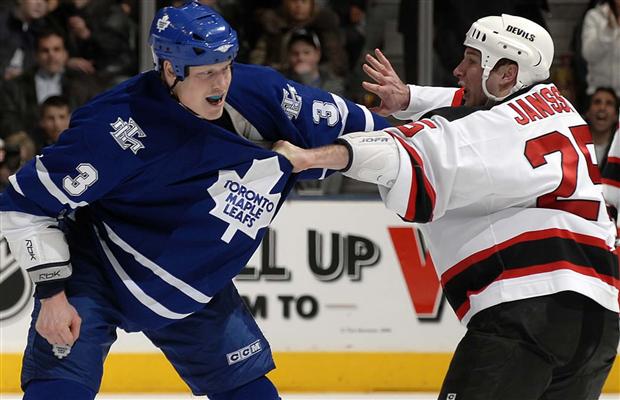
Enforcers in the NHL are the “tough guys.” These are the guys that intimidate the star players on the other team, while protecting the star players on their own team. These are the players that are constantly getting into fights. As we all know, fighting can lead to concussions. According to Dr. Paul Echlin, a sports medicine physician, in the article, “After Concussions, Varsity Hockey Players Show Micro Brain Damage: Studies,” he says,”It means we’re finding organic, objective evidence of this trauma. We know that trauma occurs. We know that in soft tissue you’re going to have these findings of inflammation and neuroplasticity, which means changes in the structure” (2014, para. 5). This is evidence that supports the damage in the brain that concussions cause. If one concussion can cause this, what can five or more concussions cause? These are the questions that has led to the NHL getting a lot of criticism for allowing fighting to take place.
This has sparked great debate over whether or not fighting should continue to be allowed in the NHL. In fact, there are studies that show Derek Boogard, as mentioned above, was suffering from chronic traumatic encephalopathy, or CTE, which is a degenerative brain disease. According to Corey Masisak in the article, “Bettman Discusses Fighting, CTE in Remarks at BOG,” he says, “Boogaard’s brain was analyzed after his May 13 death, and Branch reported the former player had CTE, which can only be diagnosed posthumously” (2011, para. 2). While it can’t be proven that the concussions Boogard suffered while playing in the NHL caused him to suffer from CTE, fans, like myself, are angered because this is where common sense should come into play.
In the same article, Gary Bettman, commissioner of the NHL, said, “”Maybe it is [dangerous] and maybe it’s not. You don’t know that for a fact and it’s something we continue to monitor. The level of concussions from fighting is not rising, it’s constant, so it’s not an increasing problem” (2011, para. 8). When I read this statement, I cringe. It shows a lack of owning up to a problem and it shows avoidance to correct the problem. The NHL is coming off as ignorant and stubborn. Who cares if the problem isn’t increasing? That’s not the point. The point is that the problem is there and it has been for a long time. Players are getting serious injuries from concussions and part of it is because the league allows players to fight and players deliver hits, or checks, to the head.
According to Jason Izraelski in his article, “Concussions in the NHL: A Narrative Review of Literature,” he says, ” As we begin to gain a better understanding of concussions and the manner in which they occur, the NHL should continue to take strict action in enforcing bans on hits to head” (2014, para. 17). Concussions are dangerous, there is no doubt about that. The mistake that the NHL is making in the public relations department is simply ignorance. Sure, they give penalties for hits to the head and fighting. They even will occasionally suspend or fine a player. The punishment, however, does not fit the crime. These players are professional athletes that have a lot of money, and the fines the league hands out are pocket change for the players. The biggest mistake the NHL makes in the public relations aspect of the business is that they don’t do a good job listening to the outcry and proof of harmful consequences. The league relies on their past reputation and current success while almost ignoring the persistent concussion problems of the NHL. Sure, the concussion numbers have been down the past few years, but the punishments for fighting or hitting an opposing player in the head are not great enough. It still happens consistently and it only takes one hit to ruin a players’ career and potentially life. If I had any control over what the NHL was doing, I don’t care how “low” the number of people complaining about concussions in the NHL is. I would make sure to make the punishments a lot more severe to the players that give out hits to the head, and I would take fighting out of the game. This issue shouldn’t only be talked about every time something bad happens.
I know, I know. Fighting is something that has been a huge part of the game for as long as it has existed. It took a long time for me to feel this way. In fact, I still struggle with this. Part of me loves fighting because it can truly alter the outcome of a game, and it’s important to stick up for your teammates. The fact that I think we are all missing, though, is the fact that the game of hockey is not bigger or more important than the health of its players.
The key for the NHL to fully succeed and get out of this mess is to be ahead of the game and prevent problems from starting in the first place. People want fighting out of the game and it is in the best interest of the players. Many people and players may not understand it while they are young and playing the game, but with the amount of former NHLers that are coming out and displaying signs of CTE and brain damage, why wouldn’t they take this more seriously? As much as I hate to say it, I think fighting has to go. It would be the humane thing to do.
Izraelski, J. (2014). Concussions in the NHL: A narrative review of the literature. The Journal of the Canadian Chiropractic Association, 58(4), 346.
Masisak, C. (2011, December 6). Bettman discusses fighting, CTE in Closing remarks at BOG. Retrieved March 8, 2015, fromhttp://www.nhl.com/ice/news.htm?id=605081
Ubelacker, S. (2014, February 4). After concussions varsity hockey players show micro brain damage: Studies. Retrieved March 8, 2015, fromhttp://news.nationalpost.com/2014/02/04/after-concussions-varsity-hockey-players-show-micro-brain-damage-studies/
